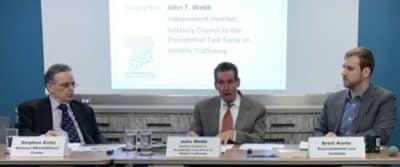The National Whistleblower Center (NWC) and the Environmental Law Institute (ELI) hosted the second part of its seminar series on wildlife crime whistleblowers on March 28th, 2017. “Representing Wildlife Whistleblowers: Technical Skills for Lawyers” focused on wildlife crime prosecutions and the powerful U.S. laws that attorneys can use when helping whistleblowers report wildlife crime. These laws include not only wildlife protection laws such as the Endangered Species and Lacey Acts, but also creative application of the False Claims Act related to customs violations, and the Foreign Corrupt Practices Act to detect bribery at ports.
John Webb, Advisory Council to the Presidential Taskforce on Wildlife Trafficking, and Stephen M. Kohn, NWC’s Executive Director, examined the evolution of federal wildlife law enforcement, and why wildlife trafficking is considered a security threat.
Wildlife Trafficking: Transnational Organized Crime
In recognizing the poaching epidemic’s severity in 2013, President Obama issued Executive Order (EO) 13648 establishing the Taskforce on Wildlife Trafficking, which is comprised of the Department of Justice, Interior, and State.
Obama acknowledged, “wildlife trafficking represents an international crisis that continues to escalate. Poaching operations have expanded . . . to coordinated slaughter, commissioned by armed and organized criminal syndicates [threatening the] survival of protected wildlife species . . . .”
President Trump also recently issued an EO, reinforcing the responsibility of the Executive branch to thwart the groups perpetrating illegal wildlife trafficking.
Today, wildlife trafficking is recognized as a transnational organized crime, which given the multi-billion-dollar global industry it has grown into, is a critical step if the government is serious about effectively combating global wildlife crime. This re-classification means authorities can devote more criminal justice and intelligence resources in pursuing wildlife trafficking cases. Law enforcement has increased domestic and international cooperation, more aggressive seizure and forfeiture practices, and prosecutions that yield much harsher prison sentences.
Strategies of Law Enforcement
Webb shared his insight into the array of legal tactics utilized by the Environmental Crimes Section (ECS) of the Department of Justice’s Environment and Natural Resources Division (DOJ, ENRD). The ENRD’s forty prosecutors fight environmental cases nationwide and the Division also hosts a repository of expert resources for training investigators and prosecutors on best practices. In addition to wildlife specific legislation, wildlife crime prosecutors are encouraged to employ all relevant criminal laws used in white-collar, organized crime such as conspiracy, smuggling, money laundering, false statements, and obstruction of justice.
Additionally, whistleblowers play a valuable role in wildlife crime detection and law enforcement efforts. Undercover operations can take years to develop with inherent and unavoidable risks, whereas whistleblowers can provide insider intelligence at greatly reduced cost, man-power, and risk.
Wildlife Whistleblower Rewards
Strong, U.S. wildlife protection laws, with international application, include robust whistleblower reward provisions. These laws include the Lacey Act; Endangered Species Act; Rhinoceros and Tiger Conservation Act; Fish and Wildlife Improvement Act, among others. Furthermore, whistleblowers can also become eligible for rewards by reporting violations of the False Claims Act related to customs violations, and the Foreign Corrupt Practices Act regarding bribery at ports. The False Claims Act and FCPA whistleblower programs are strong, viable avenues for whistleblowers to report and receive rewards. The agencies responsible for implementing the wildlife crime whistleblower provisions, however, have yet to publish clear, effective rules and policies to effectively harness the power of whistleblowers in wildlife crime detection and enforcement.
For more information on rewards for wildlife crime whistleblowers and related policy recommendations, please see the additional resources below.
Additional Resources
